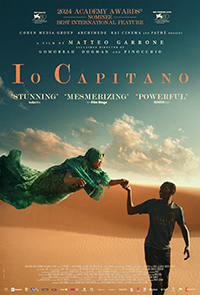Journey to Italy: Garrone Details Arduous Migrant Odyssey
 It might be a rite of passage for contemporary Italian auteurs to examine the grueling adversity faced by migrants considering the ongoing crisis which began a decade ago, as timely a cinematic subject as ever with the country’s prime ministers declaring a six-month state of emergency earlier this year. Matteo Garrone offers up his own pared down narrative in Io Capitano, following two Senegalese cousins who sneak away from home to pursue their dreams as musicians in Europe, only to immediately realize they’re quite unprepared for the horrendous conditions and nefarious obstacles in their path. Led by newcomer Seydou Sarr, a TikTok notable who represents the beating heart of the film, Garrone lends his own idiosyncratic elements of magical realism as breaks from a situation which bends from miserable to hopeless.
It might be a rite of passage for contemporary Italian auteurs to examine the grueling adversity faced by migrants considering the ongoing crisis which began a decade ago, as timely a cinematic subject as ever with the country’s prime ministers declaring a six-month state of emergency earlier this year. Matteo Garrone offers up his own pared down narrative in Io Capitano, following two Senegalese cousins who sneak away from home to pursue their dreams as musicians in Europe, only to immediately realize they’re quite unprepared for the horrendous conditions and nefarious obstacles in their path. Led by newcomer Seydou Sarr, a TikTok notable who represents the beating heart of the film, Garrone lends his own idiosyncratic elements of magical realism as breaks from a situation which bends from miserable to hopeless.
Seydou dreams of leaving behind Senegal for Europe, desiring to be a singer. He’s convinced this is a possibility thanks to his more gregarious cousin, Moussa (Moustapha Fall), who is similar in age. Seydou is initially reluctant, forbidden to leave by his mother. But an encounter with a local holy man convinces Seydou otherwise, and they soon board a bus for Mali. It’s not long before they’re conned regarding fake IDs and resort to following a guide through the Sahara desert to Libya. They’re eventually separated, with Moussa being escorted to jail for hiding his cash from rebels, while Seydou is sold into slavery. A chance opportunity for labor assists in Seydou getting out of a dire situation, but not before he’s backed into manning a shipload of refugees to Italy.
Following the footsteps of Emanuele Crialese’s Terraferma (2011), Jonas Carpignano’s Mediterranea (2015) and Gianfranco Rosi’s Fire at Sea (2016), Garrone covers similar territory and experiences but positions the narrative solely through the eyes of Seydou, whose naïveté and innocence ends up being his saving grace. The fantastical elements Garrone employs assist in underlining a fairy tale quality about the film as an epic journey, and as such, plays like the sobering neo-realistic cousin to his sinister leaning adaptation of Pinocchio (2019), another tale about a boy searching for the life he desires and running into various characters who entrap or abuse him.
The first act of Io Capitano feels relatively carefree, Seydou raised in a house full of sisters and a loving but stern mother. She’s wary when he lets his intentions slip of leaving Dakar, but doesn’t take him seriously enough. As the boys embark on their journey, they received seasoned advice on storing their money in their anal canals or risk it being stolen by various rebel group as they cross the Sahara, but the advice is unfortunately outdated, and one of the many disturbing scenes finds the inevitable rebels forcing Seydou’s entourage to drink fluids in order to defecate, their feces examined for cash. It causes his separation from Mousa, who is carted off to some unknown hell.
Things get more bleak when Libyan gangsters kidnap Seydou and his caravan, torturing those who cannot extort their families back home for money. Thankfully, a kindly older refugee (Issaka Sawadogo of Nicolas Provost’s The Invader, 2011) assists Seydou when someone arrives to buy slave labor for a wealthy landowner wanting a wall built around his compound, their services eventually allowing them to receive passage to Tripoli, where Seydou and Moussa are reunited. But sporting a days’ old bullet wound to the leg requires Moussa receive medical attention they can only properly receive if they continue their journey, leading Seydou to accept an offer to steer a ship into Italy carrying other refugees, thus earning him the titular nickname.
Considering Garrone’s filmography, Io Capitano is a welcome surprise in narrative restraint, with Paolo Carnero’s (Stefano Sollima’s crime trilogy; Mario Martone’s Nostalgia, 2022) adding some captivating imagery, particularly in the desert, where Seydou tries to resuscitate an older woman who has collapsed from the strain of the journey. In essence, it’s a film which plays like the first chapter of a much larger saga for Seydou, the key figure in one of the few refugee films which isn’t centered on escaping miserablism, instead concerned with the pursuit of dreams, though they’re left suspended in the wake of ambiguous limbo.
Reviewed on September 6t at the 2023 Venice Film Festival – In Competition. 121 Mins.
★★★/☆☆☆☆☆


